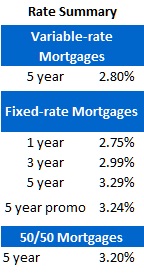David Larock in Mortgages and Finance, Home Buying
 Last week the Bank of Canada (BoC) issued its latest Financial System Review (FSR), and its governor, Mark Carney, gave a speech called “Growth in the Age of Deleveraging”. If you’re trying to gauge where mortgage rates are headed, both links are well worth the read.
Last week the Bank of Canada (BoC) issued its latest Financial System Review (FSR), and its governor, Mark Carney, gave a speech called “Growth in the Age of Deleveraging”. If you’re trying to gauge where mortgage rates are headed, both links are well worth the read.
The bi-annual Financial System Review basically outlines what the BoC is worried about and explains to what degree. Not surprisingly, the report concludes that “the risks to the stability of Canada’s financial system are high and have increased markedly over the last six months”. Here are the highlights:
- The BoC’s greatest concerns are “(i) a sharp escalation of the sovereign debt crisis in the euro area; (ii) a much weaker outlook for global economic growth; and (iii) a pronounced retrenchment from risk taking in international financial markets.”
- The report’s general assessment of the euro-zone crisis is that member countries have not responded with appropriate urgency and that their window for pre-empting a full-blown bond-market meltdown is closing rapidly.
- The BoC is also concerned about economic growth in the world’s largest economies, highlighting “the risk that household deleveraging and fiscal consolidation in the U.S. could drag the U.S. economy into another recession” and “an increased risk of a more pronounced slowing of economic activity in China”. (And although not many people are focusing on this elephant in the room yet, if China falters in a major way it will be a game changer.)
- On the topic of Canadian consumer debt levels: “[Canadian household] credit growth has slowed noticeably over the last six months” but remains a “heightened risk”.
- The report’s overall assessment is that “the global recovery is expected to remain weak and uneven”.
Mr. Carney’s Monday speech on “Growth in the Age of Deleveraging” was refreshingly candid, and for a person whose words can move markets, he certainly didn’t pull any punches. Here is a summary of what the BoC Governor said (although it is tough to write a summary that does this content-rich speech justice):
- Global debt has risen to critical levels and only hard choices remain.
- While corporate borrowing helps an economy grow because it leads to increased productivity, government and household borrowing provides an economy with little lasting benefit. (Unfortunately, almost all of the borrowing in advanced countries during this debt super-cycle has come from the latter and not the former.)
- Advanced countries simply can’t borrow their way out of their current predicaments, and they have no choice but to accept the Pyrrhic medicine of deleveraging.
- Europe is in for a long, grinding recovery: “fiscal austerity and structural adjustment will mean falling wages, high unemployment, and tight credit conditions”.
- Canada, relatively speaking, is in the best shape of any country in the G-7, but we are headed in the wrong direction since most of our borrowing is the non-productive consumer kind. We need to wean our economy off consumer spending, and businesses need to make up the difference by investing in productivity and focusing on increasing exports to emerging markets.
- In a related but more general vein, Mr. Carney said that all advanced nations need to retool their economies to replace falling domestic demand with export-led growth. At the same time, emerging countries which can no longer rely on demand from advanced countries must allow their currencies to float (and appreciate versus advanced-country currencies) while shifting their focus to domestic led growth. While this makes good sense, Mr. Carney laments that in actuality, “both sides are [instead] doubling down on losing strategies”.
Five-year Government of Canada bond yields plunged another 15 basis points last week and closed at 1.18% on Friday as investors continued to prioritize ‘preservation of capital’ over ‘return on capital’. Five-year fixed-mortgage rates inched down last week, with 3.29% now more widely available, but lenders are still pocketing the higher spreads like Scrooge instead of discounting their mortgage rates like Santa.
Variable-rate mortgage discounts continue to shrink, but prime minus .20% are still available from a lender offering attractive terms and conditions. If you’re considering a variable rate and want to see how the potential cost of current variable and fixed-rate five-year terms might compare under different interest-rate projections, check out my latest Rate Simulation analysis (posted last Wednesday).
The bottom line: I’ve said it before but it bears repeating. If Canadian consumer-borrowing rates don’t moderate, and fast, more mortgage rule changes are coming. That’s not exactly music to my ears, but all of the alternatives are worse.
David Larock is an independent mortgage planner and industry insider specializing in helping clients purchase, refinance or renew their mortgages. David's posts appear weekly on this blog (movesmartly.com) and on his own blog integratedmortgageplanners.com/blog). Email Dave



